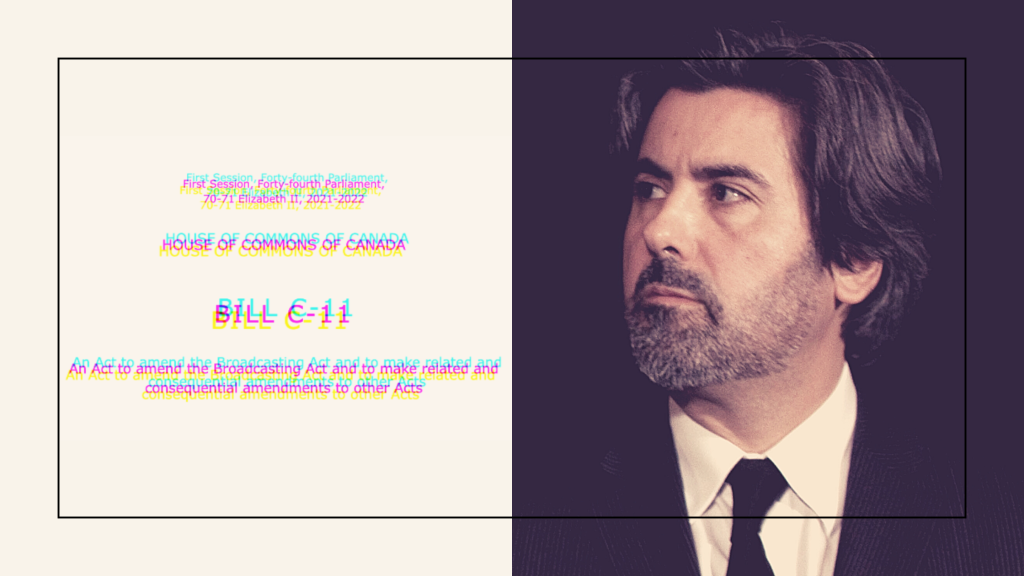
Canadian Heritage Minister Pablo Rodriguez via Wikimedia Commons (CC BY 2.0). Image adapted in Canva.
On February 2, 2023, the Senate passed Bill C-11, also known as the Online Streaming Act, with 43 senators voting ‘yea,’ and 15 voting ‘nay.’
The Senate proposed dozens of amendments to the bill, including highlighting the promotion of Indigenous languages and Black content creators; proposing an age verification system to restrict access to certain content; requiring the CRTC to be more flexible on determining what is deemed ‘Canadian enough’; and requiring the CRTC to focus on commercial content only.
Some of the proposed amendments, if implemented, would help ordinary creators, like the amendment that would require the CRTC to focus on commercial content only, while other proposed amendments may create new problems, like the amendment to promote Black and Indigenous voices. As with many diversity initiatives, this amendment may have a paradoxical effect by creating a more homogenous digital landscape in which certain voices will be promoted at the expense of others based on traits that are only skin deep. This amendment adds an extra layer of what senator David Adams Richards calls ‘censorship passing as national inclusion.’
We’ve seen firsthand what happens when diversity initiatives permeate media culture with the CBC. The Canadian public broadcaster has steadily abandoned its commitment to objective reporting and is now completely consumed by identity politics, distorting what viewers see, how stories are framed, and at its core, impacting how editorial decisions are made. Local issues that impact ordinary Canadians will go unreported, while ideological fluff stories are disproportionately elevated.
Regardless, the Senate amendments don’t mean very much to Heritage Minister Pablo Rodriguez, the sponsor of the bill. Rodriguez made it clear that he would reject any amendments that would have an “impact” on the bill. He said, “[t]here are amendments that have zero impact on the bill and others that may have some and we will not accept them.” It’s not known specifically which amendments will be rejected, though it’s evident that Rodriguez is committed to rejecting any amendment that may limit the powers of the CRTC in any substantive way.
As explained in our article “Canada’s Plans to Regulate the Internet,” Senate amendments notwithstanding, Bill C-11 can have many unintended consequences, including creating an increasingly censored Internet run by out-of-touch bureaucrats. It would effectively give more power to archaic agencies like the CRTC to control who sees what and punish creators for not being ‘Canadian enough.’ If creators do want to apply to be a certified Canadian content creator, they must complete a lengthy application through the CRTC which follows an outdated points-based system. The CRTC can also remove at will what programs they deem are inappropriate, as they did recently to a journalist at Radio-Canada.
Additionally, U.S. officials are already having discussions about taking retaliatory measures against the bill. They bring up concerns about possible discrimination against U.S. businesses. At the third reading, senator Donald Neil Plett said that retaliatory measures were inevitable, and a trade war will soon be a reality should this bill be passed in its current form. And it will be ordinary Canadians who will be impacted the most.
Some senators from the lengthy debate seemed to understand the concerns Canadian creators and consumers have about the bill, including senator Leo Housakos who points to the government’s failure to understand the difference between the Internet and traditional broadcasting. He states, “One person’s choice does not affect the ability of another person’s choice to see content based upon their own preferences and choices. One creator’s success does not come at the cost of another creator’s success. That is the difference between the internet versus traditional broadcasting and is, perhaps, the thing that us Boomers are having the most difficulty wrapping our heads and hearts around.”
Housakos adds that the bill fails to “address the realities of the digital world. . . [W]hat this legislation is actually doing is ignoring the realities of the digital age and seeking corrective action to problems that no longer exist.”
Senator Scott Tannas makes a similar argument. In order for this bill to address the current digital landscape, the CRTC must also modernize. He says, “much of the success — or failure — of the bill depends on the transformation of the current CRTC, and the shift to a more nimble regulator, as nothing kills innovation like delay.”
As it has been repeatedly pointed out, this bill is the first major update to the Broadcasting Act in 31 years. The Broadcasting Act should be updated to reflect the current landscape, but this bill does not do that. It was pushed by the same people who slept through the digital revolution. The government is setting Canadians back decades by applying outdated rules to problems that no longer exist.
The bill is set to return to the House of Commons to be passed. Rodriguez said he hopes the House will pass the bill quickly after it reviews the Senate’s changes. If the Senate simply accepts the MPs total rejection of these amendments, it will confirm what many critics have suspected all along: the entire legislative process is all political theater — nothing but smoke and mirrors to support the illusion that democracy is still alive in Canada.
For more information about Bill C-11, see our article Canada’s Plans to Regulate the Internet.



